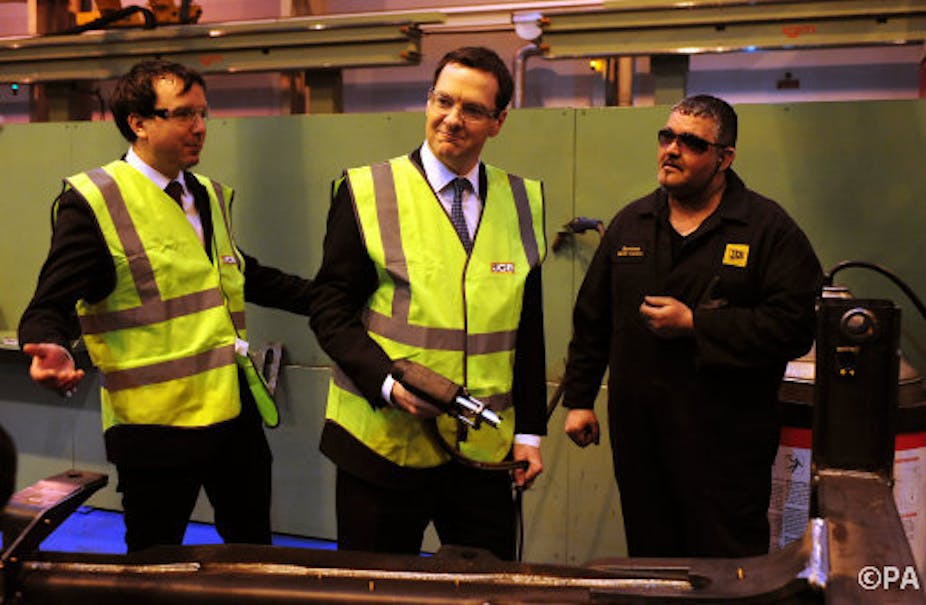George Osborne promised Britain a “march of the makers” – but as yet, there is little sign that a resurgence of manufacturing is helping the economy to rebalance.
It would be naïve to assume that manufacturing in the UK will return to its former glory in the foreseeable future. As late as 1980, manufacturing represented around 30% of the UK’s gross value added (GVA) and employed around a quarter of the workforce. It now represents around 12% of GVA, and employs less than 10% of the workforce.
Of course, a shrunken manufacturing sector does not necessarily imply poorer performance. Retaining high-skilled manufacturing jobs, as low-skilled jobs migrate to emerging economies, would mean higher manufacturing productivity and a focus on “advanced” production. Such a transformation would also improve the tradability of the UK’s manufacturing output and enhance the dispersion of skills and technology from manufacturing to other areas of the economy. As the government’s 2011 “plan for growth” acknowledged, around 40% of UK manufacturing firms are involved in technological innovation – much lower than Germany at over 70%, and behind Sweden and Finland at around 50% each.
The growth plan also promised a reduced reliance on financial services. In light of this, the SPERI British Political Economy Brief, Pay in Manufacturing and Finance, examines pay levels across different sectors to assess the extent to which rebalancing is evident so far. Broadly speaking, the news is not good.
Evidence of rebalancing
It is worth reflecting for at least a moment, however, on what good news that has come out of the manufacturing sector in recent weeks. A survey of the CBI’s manufacturing members found 35% of firms reporting “above normal” orders, compared to 23% reporting “below normal” –- a positive gap of 12 percentage points, bigger than any time since February 1995. On the whole, manufacturing output has grown alongside the general economic recovery evident in 2013.
But if the economy really were rebalancing towards manufacturing and away from financial services, we would also expect the pay gap between the two sectors to shrink. Higher pay in manufacturing would also show that the sector was becoming more productive.
Unfortunately, the latest data offer little suggestion of rebalancing. At the beginning of 2000, manufacturing workers were paid around 20% more than the national average; by September 2013, this had fallen to around 15%, though there has been a slight convergence since 2008. In contrast, the pay gap between the finance and insurance sector and the national average has largely been maintained: that fell from around 90% in January 2000 to around 70% in September 2008, but has since recovered to around 85%.
An even more worrying trend is the receding gap between pay in manufacturing and pay in real estate activities (that is, housing market-related employment). In September 2003 manufacturing workers were paid 13% more than real estate workers, but this has now fallen to 9%. In the past five years alone, real estate workers’ pay has risen from 2% below the national average to 6% above it.
High-skilled workers are therefore more likely to be attracted away from tradable and technology-intense manufacturing to an industry requiring lower, generic skills which is highly prone to frequent downturns. This helps to explain the current paradoxical situation, where manufacturing output is growing but exports are falling. We are making more stuff, but not enough of the high value-added products that other countries want to buy.
Evidence on pay points us to another important trend: the failure of sectoral rebalancing in the UK economy is also the failure of geographical rebalancing. Manufacturing is concentrated in the North and the West Midlands; London has a lower proportion of people employed in manufacturing than any other region, but of course dominates employment in finance and the housing markets.
This analysis raises an inevitable question: is the conclusion that the government has failed to rebalance the economy too premature? The rhetoric of party politics and demands of 24-hour media invite us to imagine that governments are omnipotent, and therefore exclusively to blame should their policies fail to deliver immediate results. Clearly, this is not the case, and it may take many years –- even decades –- for sectoral rebalancing efforts to bear fruit.
Indeed, there is evidence that the coalition government has sought to direct more investment to manufacturing in the UK. However, this support pales in comparison with the much more significant effort to boost the housing market, and by implication financial services, through Help to Buy, Funding for Lending and low interest rates. It is all too apparent, therefore, that not only has sectoral rebalancing yet to materialise, but that the government has largely abandoned any efforts to bring it about.

